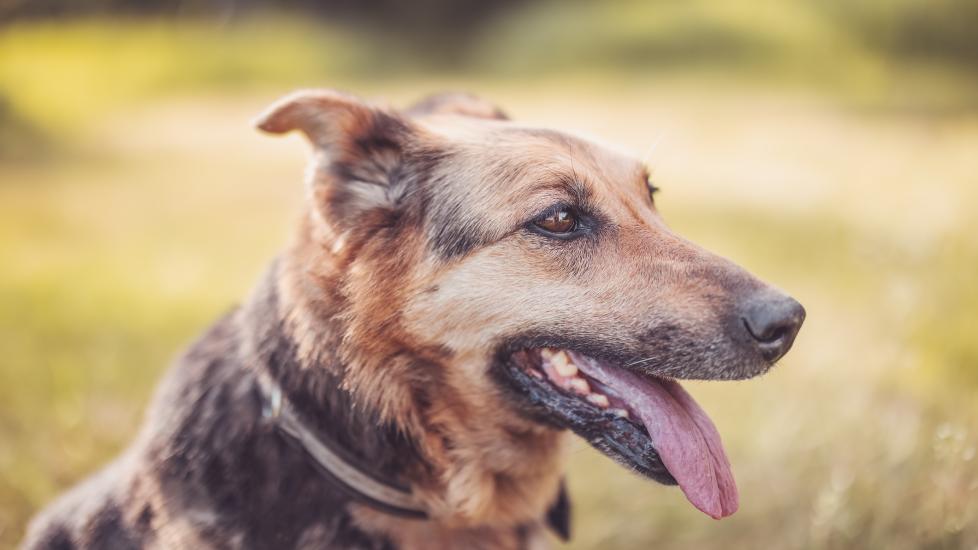7 Dementia Symptoms in Dogs
LeManna/iStock / Getty Images Plus via Getty Images
Do Dogs Get Dementia?
Canine cognitive dysfunction syndrome (CCD or CDS) is a condition related to the aging of a dog's brain, which ultimately leads to changes in awareness, deficits in learning and memory, and decreased responsiveness to stimuli. This syndrome in dogs has been compared to dementia or Alzheimer's in humans.
Although the initial dementia symptoms in dogs are mild, they gradually worsen over time, beyond what can be expected with normal aging. These pups experience cognitive decline, or the slow decrease in the brain’s ability to perform normal tasks.
Dog Dementia Stages
Dementia symptoms in dogs usually start slowly and build over time.
Every pet is different, and the signs will also vary between animals. If your pup is starting to show signs of concern, contact your veterinarian.
You can use the DISHAA map shown below to help know what to look for. For each category, give your dog a score from zero to four. Zero means no signs at all, while three means significant changes.
If your dog scores more than four when you add up the total categories, it’s time to contact their veterinarian.
7 Common Dementia Symptoms in Dogs
The DISHAA acronym can help pet parents characterize the most distinct signs and changes associated with CCD.
DISHA refers to these symptoms:
- Disorientation
- Interactions with family members or other pets
- Sleep-wake cycle changes
- House soiling
- Activity and anxiety level changes
Let’s look at the most common dementia symptoms in dogs.
1. Disorientation
One of the most common things you may notice is that your senior dog gets disoriented even when he’s in his normal or familiar environment.
Your dog may also have trouble with spatial awareness. They may wander behind the couch and then realize they doesn’t know where they are or how to get out.
At bedtime, you may find your dog in a different part of the house, staring at the wall instead of curled up in their dog bed.
2. Interactions
Canine cognitive dysfunction can affect your dog’s interactions with people and other animals.
Some dogs with CCD withdraw from their family and their favorite activities. They may fail to notice when the doorbell rings and seem disinterested in greeting visitors, or they may stop barking at the mail carrier. Your dog may not even respond when you get his leash out to go for a walk.
Talk with your veterinarian if you notice changes in the way your dog interacts with those around him. They can help rule out potential health issues and help you learn how to support your dog’s evolving needs.
3. Sleep/Wake Cycles
A change in sleep patterns or a disruption in circadian rhythms is one of the more specific dementia symptoms in dogs.
Dogs that used to sleep soundly may now pace all night. Many dogs reverse their normal schedules, so their daytime activities become their nighttime activities. This nightly routine can be frustrating and tiring for pet parents.
4. House Soiling
Urinating or defecating in the house is one of the most common dog dementia symptoms, especially if the dog was previously house-trained.
It’s important to consider that your dog may have lost their ability to voluntarily control elimination or even to let you know that he needs to go outside.
5. Activity and Anxiety
Dogs with cognitive dysfunction may show a decreased desire to explore and a decreased response to things, people and sounds in their environments.
They may not greet you or they may no longer respond on cue to fetch their favorite toy. They may also be less focused and show an altered response to stimuli.
6. Having Trouble Finding Food and Water Bowls
Some dogs have trouble finding their food bowls.
When dogs become disoriented and find themselves somewhere in the house where they do not usually spend time, they may have difficulty tracing their way back to their normal turf, including where their food and water lives.
7. Repetitive or Restless Movements
Although older dogs experience a normal decline in activity levels, they may also experience symptoms that seem like restlessness.
Dogs may begin to pace randomly or stare out a window and bark when there is nothing there. They may repeatedly return to an area like a corner and then appear to get "lost".
This will often be more common in the late evening and overnight hours, particularly if they are not able to use their vision as well as they used to.
Using night lights and confining your pup to familiar areas may help to reduce these concerns.
It’s important to rule out medical conditions as certain symptoms—such as inappropriate urination or defecation—may have other causes.
When to See a Veterinarian for Dog Dementia Symptoms
Many dementia symptoms in dogs can also occur with medical problems, so it’s important to consult your veterinarian when you first notice these signs.
Your veterinarian may recommend some baseline tests such as blood work. This is not only check for a current underlying problem, but also to have results to compare to should things change in the future.
